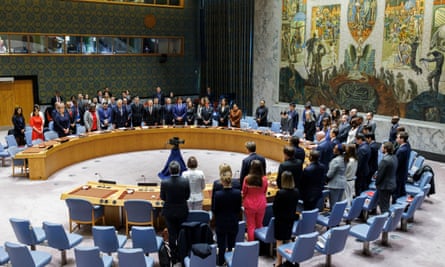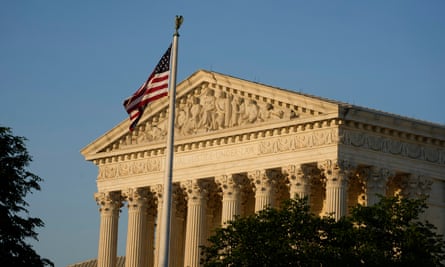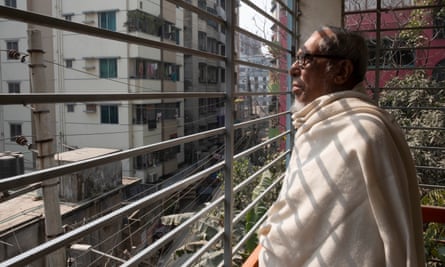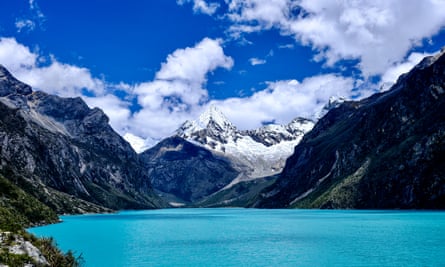Good morning.
Maryland is in a state of emergency, the governor, Wes Moore, has announced, after at least seven vehicles fell into a river after a bridge in Baltimore collapsed after being hit by a cargo vessel early on Tuesday.
The city’s fire department said it was searching for at least seven people believed to be in the Patapsco River, after a ship collided with Francis Scott Key Bridge at about 1.30am, with the vessel appearing to catch fire. A dive team was deployed.
The Synergy Marine Group, the manager of the Dali container ship, said all crew were accounted for and no injuries had been reported, according to Reuters.
How many people fell into the water? A spokesperson for the Baltimore city fire department, Kevin Cartwright, said it was too early to know, but called the collapse a “developing mass-casualty event”. The latest updates are on our liveblog.
Israel isolated as UN security council demands immediate ceasefire in Gaza

The UN security council has voted for a resolution demanding an immediate and lasting ceasefire in Gaza – the first to pass since Israel’s war against Hamas began five months ago.
The move, which became possible after the US dropped its veto and instead abstained, leaves Israel increasingly isolated globally. The text demanded “an immediate ceasefire for the month of Ramadan leading to a lasting sustainable ceasefire”, and called for a release of hostages – though it did not make this a condition of the truce.
In response, Benjamin Netanyahu, the prime minister of Israel, said the US had “abandoned its policy in the UN” and cancelled the visits of two ministers to Washington intended to discuss the planned Rafah offensive.
A planned trip by the Israeli defence minister, Yoav Gallant, went ahead, with the US secretary of state, Antony Blinken, stressing that there were better alternatives to a ground invasion, which the US opposes.
Why did the US veto? It requested a condemnation of Hamas minutes before the vote, which was resisted. Linda Thomas-Greenfield, the US envoy to the UN, said the US did not agree with everything in the resolution but fully supported some of the critical objectives. You can follow our liveblog here.
US supreme court to hear first major abortion case since Roe decision

The US supreme court will on Tuesday hear its first major case on abortion since the 2022 overturning of Roe v Wade, thrusting the future of medical abortion drug mifepristone into the spotlight.
The case, brought by rightwing groups, seeks to reverse measures taken by the Food and Drug Administration (FDA) to widen access to the drug in recent years. Since the Covid pandemic, the FDA has allowed telehealth medication abortions, helping to soften the blow of state abortion bans enacted since Roe’s overturning.
Regardless of whether the court rules to restrict telehealth abortions, Americans will still have the option to order drugs online from providers who help people “self-manage” abortions.
How many abortions are facilitated through telehealth? About 16% of all US abortions, according to analysis.
In other news …

A proposal to end the military exemption of ultra-Orthodox students has sparked a heated debate in Israel. Netanyahu has reportedly warned that failure to pass the law, to be discussed on Tuesday, could risk the stability of the government.
The coroner of a south-west Louisiana community, who took office on Monday office despite charges of child molestation, is to cut an exam program that helps collect evidence of sexual assault. Dr Christopher Tape, who was elected without opposition, is expected to face an effort from voters to recall his election, according to a senior local government official.
Scientists are “cautiously optimistic” after finding that penguins in Antarctica are testing positive for bird flu without showing symptoms. The virus arrived in the region this year, leading to concerns of ecological disaster – and fears remain they could spread the illness to vulnerable species.
Stat of the day: one in four Americans believe Alex Jones’s false claim that Sandy Hook school massacre never happened

One in four Americans believe Alex Jones’s false claim that the 2012 Sandy Hook school massacre of 20 children and six staff in Connecticut never happened, according to an HBO documentary. The Truth vs Alex Jones shows how the “whole theatre of disinformation” clashed with the courts as parents took the conspiracy theorist to court – and laid his lies bare.
Don’t miss this: how chaotic, polluted Dhaka puts cars before its elderly citizens

As Dhaka rapidly expands, it is failing to cater for its older and less mobile residents. Kaamil Ahmed speaks to people trapped indoors as the the Bangladeshi capital puts vehicles above people. “I used to walk around by myself but now I don’t feel safe any more,” said one 85-year-old man.
Climate check: crisis increases fears of glacial lake flood in Peru

In 1941, one of history’s most destructive glacial lake outburst floods – a phenomenon in which dams burst, sending vast quantities of water gushing out – killed between 1,800 and 5,000 people in the Peruvian city of Huaraz. Now, scientists warn the climate crisis is increasing the risk of another glacial lake flood – with potentially devastating consequences for the city’s 120,000 residents.
Last Thing: Jeans editing: BBC presenter’s denims blurred by North Korean TV censors

These days, Alan Titchmarsh, the gardener and presenter of a BBC gardening show, is a familiar face on North Korean state television. But a policy of banning jeans – because they are considered a symbol of US imperialism – recently led to the 74-year-old presenter being blurred out from the waist down, appearing to hover as he pruned.
Sign up
First Thing is delivered to thousands of inboxes every weekday. If you’re not already signed up, subscribe now.
Get in touch
If you have any questions or comments about any of our newsletters please email newsletters@theguardian.com
